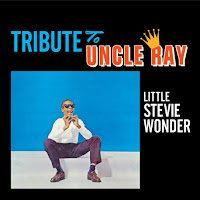Tribute to Uncle Ray - Stevie Wonder
As inconsistent as Stevie's output was back then, I find it hard to get mad at any of these albums. Maybe it is my blind love for Stevie, or perhaps I forgive him because of his age. My best guess is that it is really just Motown's lack of cognizance when it comes to putting together records. Now, I understand that Motown aimed almost entirely at the singles market and put together albums for people who wanted a little more. I get that Motown operated like a music factory rather than an artistic pressure cooker. Yet, some of their decisions were just so bizarre and straight-up bad that it makes me wonder what kind of people they were allowed to assemble records.
Listen, I deeply love Ray Charles, one of my absolute favorite artists. I've probably memorized the originals covered here (along with the rest of his Atlantic singles). Don't you think I am giving this a bad rating because I do not love Ray with all my heart. It's just that Stevie Wonder and Ray Charles are not two artists that you can mix together just because both happen to be blind geniuses. Ray's voice and style are mature, gutsy, and rough, and songs like "Come Back" and "Don't You Know" are very suggestive and sexual in nature. It takes a real master to take on any of Ray's tunes, and as great as Stevie would become by 1972, he was and never can be like Ray. Stevie's greatness lies with intricately crafted smooth R&B overflowing with joy and humanism, a different paradigm entirely. This doesn't mean Stevie's music is unchallenging and boring because it is less "gritty" (you wouldn't say Brian Wilson was inferior to the Rolling Stones because he was less earthly, right?), but this is not the music he should be singing, period.
These six covers very clearly show this issue. Stevie's young age and inability to match the gutsy phrasings of "Drown In My Own Tears" make his cover truly painful to sit through. Maybe if he was a bit older with more singing experience, this would be tolerable, but this is just not a song he could have done well. "Ain't That Love" might look more promising, but it is still a very tough groove that Stevie couldn't handle yet. These are still better than the nauseating covers of "Don't You Know," "Mary Ann," and "Come Back Baby." The LAST thing I want to hear is a prepubescent kid forcing out sexual groans to imitate a grown man. Whoever listened to these tracks and didn't see any moral issues with releasing them is going straight to hell, that's for sure. The other songs aren't too bad, but they're either not terribly impressive or notable (did the world need yet another cover of "Frankie & Johnny?").
Thankfully, he did a great job with "Hallelujah I Love Her So." Maybe I am biased because it is my favorite Ray Charles song, but this is the only one I feel is well suited for Stevie. The original still has strong sexual romantic implications, but it is mainly a song expressing joy for being alive. Stevie capitalizes on that aspect and converts it into an expression of innocent, child-like joy. There's so much enthusiasm and energy to this cover that I don't even care when he misses a note. This one does show Stevie's young charisma much more than the general limpness of the material here.
At the very least, failing to imitate the magic of Ray Charles is much easier to digest compared to failing to adequately cover show tunes and third-rate surf anthems. The material they chose for this album is generally OK and produced at least one winner. Compared to this, the following two albums are much, much worse. Let's just be thankful that this 2-year slump didn't end his career, and the record label eventually got him on the right track soon enough. Luckily for us listeners, we can entirely forget that these early records even existed in the first place.











